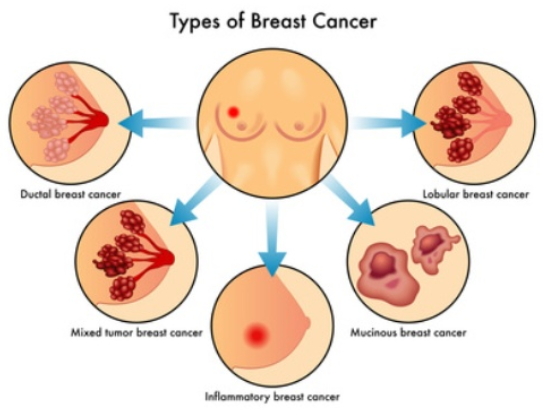PCOS and Breast Cancer
PCOS is not commonly associated with an increased risk of developing breast cancer. However, there are several aspects of this disease that could increase your risk, such as excessively high levels of estrogen and male hormones, and poor blood sugar control.
Free PCOS Newsletter
Glucose Metabolism Implicated in Breast Cancer
Many PCOS women have elevated or fluctuating levels of blood sugar (glucose). A study conducted at the University of Buffalo has shown that high blood sugar levels leads to increased breast cancer risk in premenopausal women.
The study followed 10,786 women for 5.5 years. They found that women with the highest blood glucose levels were 2.8 times as likely to develop breast cancer as compared to those with the lowest glucose levels.
If your blood tests have shown that you have a high-normal or clearly elevated blood glucose level, you will want to take steps to control both your blood glucose and your insulin levels in order to reduce your risk of developing breast cancer later on. A healthier diet and regular exercise is an excellent way to get started.

Breast Cancer, Male Hormones and PCOS
High levels of male hormones, or androgens, in young women apparently raise their risk of developing breast cancer, according to a recent report.
Androgens are normally present in women, although at much lower levels than in men. However, in women with polycystic ovarian disease, androgens are frequently elevated.
Elevated androgen levels have been linked with breast cancer in studies of postmenopausal women, but it was unclear if this also applied to pre-menopausal women.
Scientists at the International Agency for Research on Cancer in France compared androgen levels in 370 premenopausal women who were later diagnosed with breast cancer with levels found in 726 similar women without breast cancer.
The likelihood of developing of breast increased significantly as levels of male hormones rose.
The risk of women younger than 40 years developing breast cancer over a 10-year period ranged from 2.6% for those with the highest testosterone levels to 1.5% among those with the lowest levels.
There was also a correlation between lower levels progesterone and increased risk of breast cancer. Note that women with polycystic ovary syndrome typically have lower than optimal progesterone levels.
The study "provides strong evidence that the risk of breast cancer among premenopausal women is directly related to circulating levels of testosterone and androstenedione," according to the authors of the study.
In other words, women with PCOS have a hormonal profile (elevated androgens, low progesterone) that matches the high risk group for breast cancer in this study.
It's smart to pay attention to polycystic ovary syndrome and use every means at your disposal to get it under control.
We recommend that you make healthy, intelligent lifestyle choices in addition to whatever medications you may be taking. It's well known that diet, exercise and stress management play a very helpful role in controlling polycystic ovary syndrome and reducing cancer risk.
Related Cancer Articles
Sources:
Muti, P et al, Fasting glucose is a risk factor for breast cancer: a prospective study, Cancer Epidemiol Biomarkers Prev, 2002, 11(11): 1361-8
Kaaks R et al, Serum sex steroids in premenopausal women and breast cancer risk within the European Prospective Investigation into Cancer and Nutrition (EPIC), J Natl Cancer Inst. 2005 May 18;97(10):755-65
Get Answers to your Questions about
- Fertility
- Weight Control
- Hair Loss
- Stress
- Unwanted Hair
- Acne...and more!
FREE PCOS Report
and Newsletter

Your email is safe with us. We respect your privacy, and you may unsubscribe at any time.
Recent Articles
-
PCOS Long Journey to The Happy End
Apr 30, 18 07:24 PM
Hi Girls, Maybe my story will have one day a good end but I am not there yet. Until I was 31 years old I lived my dream, having lovely husband, good -
PCOS and Miscarriage
Apr 17, 18 04:03 PM
Proper diet and natural supplements can help the body maintain a pregnancy through successful delivery.
-
How to Deal with PCOS and Stress
Apr 04, 18 04:19 PM
Your body has a natural capacity to heal itself if you provide it with the necessary tools.





